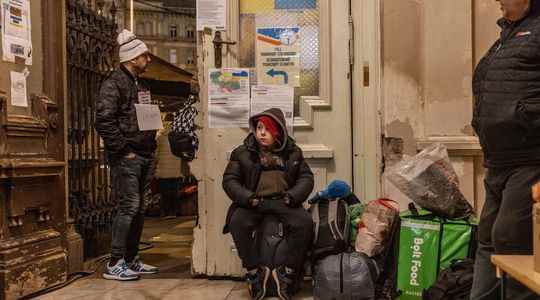Usually, the small town of Zahony vibrates to the rhythm of trucks passing through customs between Ukraine and Hungary, and the movements of workers from the Hungarian minority of Transcarpathia who have come to seek better wages on the other side of the river separating the two countries. But since the launch of the Russian offensive, the border town of 4,000 souls, the main access point to the rest of Hungary, has seen more refugees arriving every day than it has inhabitants.
In the modest hall of the Zahony station, displaced people from all over Ukraine, forced to exodus by the bombings, disembark from crowded shuttles and accumulate delays. As soon as they arrive, they get free “solidarity tickets” to Budapest, granted by the Hungarian government. One sees especially in the crowd of women, young children and students of African or Indian origin. On the faces, fatigue and the feeling of finally being safe. Near the quays, an exhibition retraces the Soviet domination of Hungary. On June 19, 1991, the last occupation soldier left the territory from this same station.
Government oversees fundraising for refugees
Aleksandra comes from Dnipro, an important industrial center in central Ukraine. Exhausted, this tall blonde in her thirties has just traveled for two days with her 5-year-old daughter and is on her way to Budapest. “Putin bombed our airport and some places inside the city, where many civilians live. We must protect our children while the men protect our motherland”, exclaims the young woman.
In front of the station, a local association offers sandwiches, cakes and bottles of water. And the mayor, an independent, struggles to organize transfers by minibus or temporary accommodation in a local technical school. The central authorities do not see any inconvenience there. Because, unlike the summer of 2015 when it blocked refugees from the war in Syria going up the Balkan route with a barbed wire fence, Viktor Orban’s anti-migrant government is now opening its arms to Ukrainian exiles. The difference in treatment is total. The State oversees a collection of funds to relieve people in difficulty. And even offers jobs to those wishing to settle in Hungary, seizing the opportunity to fill the country’s lack of manpower, especially in the construction sector.
A symbol of this change in attitude, the Minister of Justice and European Affairs, Judit Varga, welcomed a family from Transcarpathia in front of the cameras and donated the equivalent of 1,300 euros to a foundation supporting refugees. “We are able to tell the difference between migrants and refugees. Migrants are stopped, refugees can get all the help they need”, justified Viktor Orban – even if the Syrians were also fleeing the war .
Unfailing support from Hungarian society
The Hungarian population is on the same wavelength. On the arrival platform of Budapest-Nyugati station, the large station in the west of the capital where refugees who have entered the country converge, civilians offer their interpreter services or share the 4G connection of their smartphones. A few meters further on, an aid center run by NGOs collects donations of basic necessities. Meals and drinks are also available.
At the same time, a vast support group has been formed on Facebook: it brings together more than 120,000 members. Internet users from all over Hungary launch appeals for donations or offer accommodation for the night. This is the case of Katia, a Franco-Hungarian woman who hosts Ukrainian exiles every day in her house in Monor, near the capital. On this day in early March, her husband runs the errands, while five refugee women and their children rest.
Valeria, 38, fled Kharkiv, a war-torn city in eastern Ukraine, with her mother, 7-year-old daughter and 12-year-old son. She found a base in Brussels, with a friend of her husband, a Cameroonian, after having experienced an ordeal. “A shell fell near our house, she says, her eyes filled with tears. They also bombed the neighborhood school. People were piled up on top of each other on the train. We did not slept for four days. I’m not sure that Ukraine will still exist in the future.”
At Budapest-Keleti station, in the east of the Danubian city, the epicenter of the 2015 refugee departures to the west before Orban barricaded the Serbian border, Irina hurries to catch a train bound for Munich. A temporary foster family will pick her up in Germany. Like hundreds of thousands of Ukrainians, she has no idea what her life will look like tomorrow.
